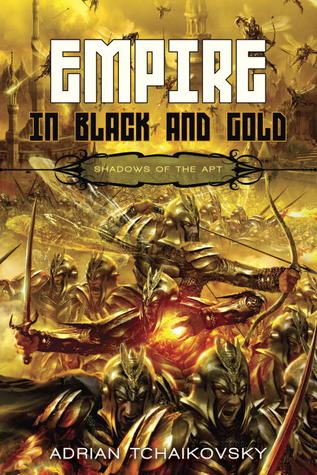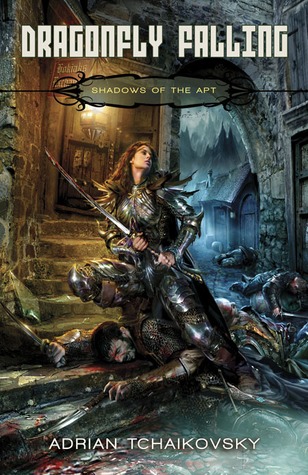“Seventeen years ago Stenwold witnessed the Wasp Empire storming the city of Myna in a brutal war of conquest. Since then he has preached vainly against this threat in his home city of Collegium, but now the Empire is on the march, with its spies and its armies everywhere, and the Lowlands lie directly in its path. All the while, Stenwold has been training youthful agents to fight the Wasp advance, and the latest recruits include his niece, Che, and his mysterious ward, Tynisa. When his home is violently attacked, he is forced to send them ahead of him and, hotly pursued, they fly by airship to Helleron, the first city in line for the latest Wasp invasion.”
I’m sure every reader knows the feeling of starting a book you’re skeptical about and being pleasantly surprised. Empire in Black and Gold, the first in Adrian Tchaikovsky’s Shadows of the Apt series, was just that and so much more. I had continually pushed it down on my to-be-read list because the whole insect idea just didn’t click with me. Eventually I caved, thinking that I had nothing to lose. Tchaikovsky writes quickly fast for a new-ish author whom not all that many people know about, so subsequent novels did not have readers long in waiting.
The human race is divided into several different insect-kinden and each kinden has an Ancestor Art. From what I gather, we have Beetles who tend to be more stout than the others, but also more resilient, with very rare encounters of flying Beetles, and even then they’re bad at it. The Beetles are one of the Apt races, therefore they can use technology. Dragonflies are gold of skin and can fly and are much more dexterous and quick than other races, but inapt, and have weapons called ‘thumb claws’ that are explained in the book as variations of talons. Wasps can fly and ‘sting’, meaning their Art allows them to shoot what is essentially a ball of fire from their hands. Flies are much smaller than others, Mantids are deadly warriors, the list goes on and Tchaikovsky does a great job explaining them. Apt races can use technology, while the inapt ones literally cannot grasp how to use something even as simple as a doorknob.
The cast has many likable characters and their development is top-notch. We see the ever-growing cast change from mostly casual Collegium residents to soldiers hardened by their struggle. I think the strongest aspect of Tchaikovsky’s narration is that we are shown the conflict through people on both sides, taking us through the ambitions of an Imperial agent who only wants to serve his Emperor and to a group of untrained spies who are thrown in over their heads. Empire in Black and Gold is Tchaikovsky’s debut, so in using so many characters he somewhat stumbles in the narration, but it was not nearly enough to make me want to stop reading.
The basic plot-line is that Stenwold, a Beetle, has been preaching to everyone for 17 years of the imminent Wasp threat, but nobody has listened. The Wasps continue to move and mobilize, and he is laughed at. He has become something of a spymaster in Collegium and he recruits our cast of young spies in an attempt to make the threat of the imminent invasion visible to even the blissfully ignorant Masters of Collegium. The action is very well written and keeps coming. Just when you think there’s a lull, something happens and the story becomes once again a tale of heart-pounding action. From hand-to-hand combat with any variety of melee weapons found in the novel to nailguns and flying machines such as the orthopter or heliopter, Adrian weaves a thrilling tale of what boils down to a race against time in an attempt to prepare for the invasion.
My electronic version finished at ~86%, which was strange, but included several little short stories not relevant to our cast that seemed quite interesting but I have yet to read. I wasn’t left with an insane cliffhanger, but there was without a doubt motivation to read more. Most first novels in an epic fantasy series tend to be written to set up the rest, and Adrian did a brilliant job setting up the series, but he did so with some added pow. The fantastic prologue had me hook-line-sinker and along for the ride in its Black Hawk Down, heart-pounding style of thrill. Empire in Black and Gold was absolutely worth the read and I highly recommend it.
“Two young companions, Totho and Salma, arrive at Tark to spy on the menacing Wasp army, but are there mistakenly apprehended as enemy agents. By the time they are freed, the city is already under siege. Over in the imperial capital the young emperor, Alvdan, is becoming captivated by a remarkable slave, the vampiric Uctebri, who claims he knows of magic that can grant eternal life. In Collegium, meanwhile, Stenwold is still trying to persuade the city magnates to take seriously the Wasp Empire’s imminent threat to their survival.”
In Dragonfly Falling, second novel of Shadows of the Apt, the plot that began in Empire in Black and Gold continues at a breakneck pace. We meet new characters, find new motives in old characters, and are shown a multitude of twists that come completely unexpected.
Dragonfly Falling is about war. The entirety of the novel takes us from siege to siege, battle to battle, and duel to duel. We live through the sieges, from frontline infantry to generals in command on either side. We see many vehicles from Empire in Black and Gold such as the heliopter, but now we have tank-like armourclads leading the charge. Outside of the air and land battles, we are introduced to the naval aspect of warfare in the nameless world Tchaikovsky has created. Submarines, floating armourclads, flagships, you name it. No matter the scene, no matter the vehicle, no matter the person, from the sergeant in the Tarkesh army to the Emperor of the Wasps, we’re given a gripping tale of warfare; of kinden fighting for their very existence. The steampunk style of technology continues to dazzle and is deftly described in its application to this war.
The issue from Empire in Black and Gold where Tchaikovsky fumbled with associating so many characters is more or less resolved, and with even more characters added to most of those from the previous novel. The scale of the series is huge, and Adrian tackles it brilliantly. Throughout the first two novels, I’ve grown attached to Thalric, an Imperial agent who does what he does for his country, regardless of its goals. He reminds me somewhat of Erwin Rommel, who was a Nazi only in name and did not necessarily agree with what he was told to do – he just followed orders.
Anyway, Dragonfly Falling was a fantastic addition to the Shadows of the Apt arc. Just as in the first novel, we’re left off with an end that is essentially the calm before the storm. Tchaikovsky has proven himself to be adept at writing endings that aren’t the kind of cliffhangers where someone’s being held at swordpoint before the text cuts off, but are still compelling enough to make me want more. He only improved from the first novel to the second, and I hope he continues to do so in the third, Blood of the Mantis.


